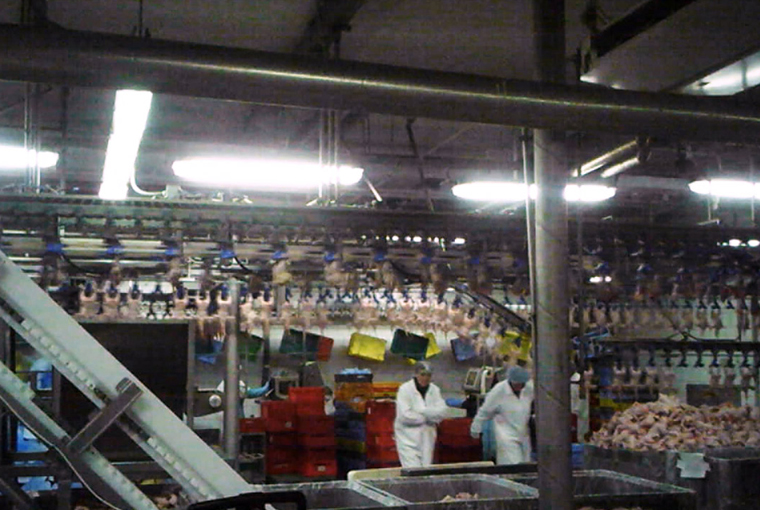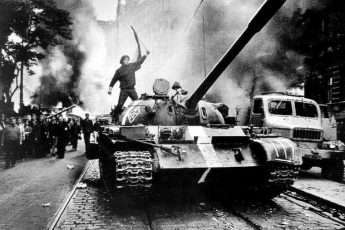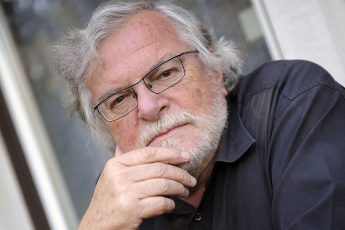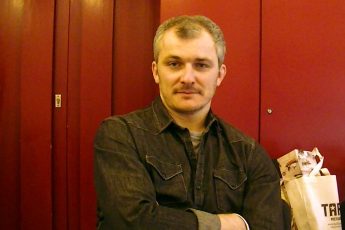Postcards from the Edge of Late Capitalism
Apolena Rychlíková’s The Limits of Work (Hranice prace, 2017)
Vol. 80 (December 2017) by Zoe Aiano
The Limits of Work falls firmly within the category of documentaries that address social issues we are all already fully aware of, but which are so commonplace that we stop being outraged. The burning issue in this instance is minimum wage labour. With Apolena Rychlíková at the helm as director, journalist Saša Uhlová sets herself the task of spending six months in a series of low-skill, low-pay sectors, with the aim of fully understanding and revealing the conditions faced by workers in this disregarded sector of society, referred to by Uhlová as “Heroes of Capitalist Work” in the online reporting that accompanied her experiment on the a2larm.cz website.
After dying her hair and giving herself a slightly questionable working class makeover, Uhlová’s first port of call is the laundry of a hospital, followed by a chicken packing plant, a supermarket checkout, a razor factory and a waste sorting centre. Throughout her journey, she faces absurdly long shifts at ungodly times of the day, requiring awkward travel and accommodation arrangements that take her far away from her home and family. Small, everyday logistics suddenly become infuriatingly complicated, and her free time and energy dwindle to point of practically non-existent. Through her running commentary, the journalist not only describes this slice of life as she experiences it, but also poses important questions about exactly why it is that people continue to work under these conditions, and why employers are making no effort to improve them.
This is undercover investigation at its most classical. Formally and visually, the film offers little in the way of innovation or titillation, and indeed it would be unreasonable to expect anything ground-breaking from a film largely shot on a pair of glasses fitted with a spy camera. The Limits of Work is very straightforward and unflinching about its agenda, which it makes explicit through periodic facts and figures, such as what percentage of the Czech population earns minimum wage and how much they actually take home, as well as the specific details concerning each of Uhlová’s workplaces.
However, the strength of the film, and its most persuasive asset, is the convincingly humane passion of its protagonist, who seems to feel genuine concern and warmth for her co-workers, adding a relatable personal layer to the bare statistics. In the intimacy of her home, we see how she struggles to cope with time away from her family, especially in terms of her relationship with her young son. In one particularly poignant scene, he resentfully rejects her as her work (in this case, as a supermarket checkout assistant) forces her to be increasingly absent.
At the workplace, she becomes attached to various colleagues, compulsively revealing the truth about herself to them and maintaining friendships even after she has left one place and moved onto the next. She manages to avoid being patronising and pitying by being frank about her own difficulties with the work and by keeping the human, relational aspect of work in the foreground at all times. Indeed, her approval or disapproval of a particular workplace often hinges on the opportunities given to her to form bonds with those around her. This compassion is then combined with a fixation on banal minutiae – exact times, exact salaries, in-depth descriptions of the type of public transport people take to go food shopping – which successfully flesh out the descriptions, adding an empathetic depth that goes beyond the factual and makes the workers’ lives more tangible and real.
Uhlová also adapts her methodology along the way out of consideration for the people she is affecting, as she becomes increasingly aware of the implications of her presence and eventual disappearance. For example, while she was hired in her first position on a permanent basis, she subsequently decided to only sign up for short-term contracts, in the interests of minimizing her disruption and avoiding any frustration or disappointment among those who may have been counting on her to stick around. That said, the filmmakers seem to have taken certain ethical liberties predicated on the assumption that viewers will understand their intentions to be good. It is not clear how many details have been changed or how much sensitive material was purposefully disregarded, but the film fails to acknowledge or account for its approach to obtaining consent from the people filmed in secret, and so questions could very justifiably be raised in this regard.
Like the majority of Czech documentary released in 2017, The Limits of Work has singled out a poignant, topical, pressing subject, stuck rigidly to a classical (arguably outdated) format and basically alienated any potential foreign interest by staying firmly rooted in its native context, although in this particular instance this grounding is more than justified and would be hard to avoid. The online/on-screen pairing seems to have worked well in generating a debate and raising awareness locally, and perhaps that is as much as can reasonably be expected of it. However, it would be a shame if the film failed to travel, given that many of the arguments and points it makes could inevitably and sadly translate well to numerous other cultures. The tension between local/particular and global/general is likely to stay an issue for small nation cinemas for the foreseeable future, and no obvious solution to this presents itself, except perhaps greater open-mindedness of the part of international audiences or, more pertinently, distributors. Certainly, the combined efforts of Rychlíková and Uhlová would stand a greater chance of being more widely viewed if the concept itself were more grabbing and original, but, within the trite world of covert reporting, the film stands out for its blunt, non-salacious statements and the earnestness of its protagonist.




Leave a Comment